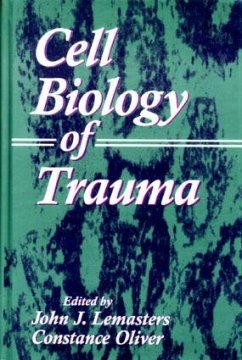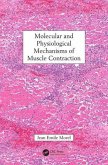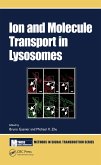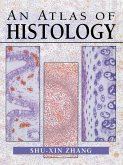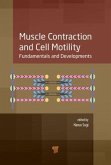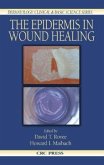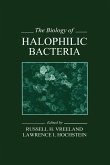- Gebundenes Buch
- Merkliste
- Auf die Merkliste
- Bewerten Bewerten
- Teilen
- Produkt teilen
- Produkterinnerung
- Produkterinnerung
This unique book presents an approach to viewing trauma. It examines the cellular consequences of trauma at a molecular level and provides new insights into the treatment of traumatic injury, based on cellular responses. The current of trauma research is reviewed, previously unpublished information on the topic is presented, and research directions are included.
Andere Kunden interessierten sich auch für
![Molecular and Physiological Mechanisms of Muscle Contraction Molecular and Physiological Mechanisms of Muscle Contraction]() Jean Emile MorelMolecular and Physiological Mechanisms of Muscle Contraction227,99 €
Jean Emile MorelMolecular and Physiological Mechanisms of Muscle Contraction227,99 €![Ion and Molecule Transport in Lysosomes Ion and Molecule Transport in Lysosomes]() Ion and Molecule Transport in Lysosomes184,99 €
Ion and Molecule Transport in Lysosomes184,99 €![An Atlas of Histology An Atlas of Histology]() Shu-Xin ZhangAn Atlas of Histology178,99 €
Shu-Xin ZhangAn Atlas of Histology178,99 €![Oxygen Biology and Hypoxia Oxygen Biology and Hypoxia]() Helmut Sies (Volume ed.) / Bernard BrueneOxygen Biology and Hypoxia184,99 €
Helmut Sies (Volume ed.) / Bernard BrueneOxygen Biology and Hypoxia184,99 €![Muscle Contraction and Cell Motility Muscle Contraction and Cell Motility]() Muscle Contraction and Cell Motility206,99 €
Muscle Contraction and Cell Motility206,99 €![The Epidermis in Wound Healing The Epidermis in Wound Healing]() Howard I. Maibach / David T. Rovee (eds.)The Epidermis in Wound Healing238,99 €
Howard I. Maibach / David T. Rovee (eds.)The Epidermis in Wound Healing238,99 €![The Biology of Halophilic Bacteria The Biology of Halophilic Bacteria]() Russell H VreelandThe Biology of Halophilic Bacteria137,99 €
Russell H VreelandThe Biology of Halophilic Bacteria137,99 €-
-
-
This unique book presents an approach to viewing trauma. It examines the cellular consequences of trauma at a molecular level and provides new insights into the treatment of traumatic injury, based on cellular responses. The current of trauma research is reviewed, previously unpublished information on the topic is presented, and research directions are included.
Produktdetails
- Produktdetails
- Verlag: CRC Press / Taylor & Francis
- Seitenzahl: 384
- Erscheinungstermin: 6. März 1995
- Englisch
- Abmessung: 243mm x 163mm x 21mm
- Gewicht: 821g
- ISBN-13: 9780849324536
- ISBN-10: 084932453X
- Artikelnr.: 22300797
- Verlag: CRC Press / Taylor & Francis
- Seitenzahl: 384
- Erscheinungstermin: 6. März 1995
- Englisch
- Abmessung: 243mm x 163mm x 21mm
- Gewicht: 821g
- ISBN-13: 9780849324536
- ISBN-10: 084932453X
- Artikelnr.: 22300797
John J. Lemasters, M.D., Ph.D., is Professor of Cell Biology and Anatomy and Member of the Curriculum in Toxicology at the University of North Carolina at Chapel Hill. Dr. Lemasters graduated in 1969 from Yale University, New Haven, Connecticut, with a B.A. degree in psychology (cum laude with honors) and obtained his M.D. degree and Ph.D. degree in anatomy and cell biology in 1975 from the Johns Hopkins University School of Medicine, Baltimore, Maryland. Dr. Lemasters is a member of the American Association for the Advancement of Science, the American Association for the Study of Liver Diseases, the American Association of Anatomists, the American Heart Association, Council on Circulation, the American Physiological Society, the American Society for Biochemistry and Molecular Biology, the Biophysical Society, the American Society for Cell Biology, the Microscopy Society of America, and the Society of Toxicology. Dr. Lemasters serves on the editorial boards of the American Journal of Physiology: Cell Physiology, Cell Calcium, and Hepatology. He has been the recipient of many research grants from the National Institutes of Health, the National Science Foundation, the American Heart Association, and the Office of Naval Research. Dr. Lemasters is the author of over 200 papers and has previously edited two books. His current major research interests relate to ischemia/reperfusion injury and organ preservation for transplantation surgery. Constance Oliver, Ph.D., is a Program Officer in the Biomedical Science and Technology Program at the Office of Naval Research (ONR), Arlington, Virginia. Prior to joining ONR she was a Research Biologist at the National Institute of Dental Research, the National Institutes of Health, Bethesda, Maryland. She received her B A. degree from Northwestern University, Evanston, Illinois, her M.S. from the University of Utah, Salt Lake City, Utah, and her Ph.D. from the University of Texas at Austin, Austin, Texas. Dr. Oliver has over twenty years of experience in the field of cell biology. Her research has focused on structure-function relationships in the secretory pathway in exocrine acinar cells and in mast cells J She has examined packaging of secretory proteins and formation of secretory granules, membrane trafficking and signal transduction mechanisms in these cells. Currently, Dr. Oliver is managing research programs in Biomedical Science and Technology. She has published extensively and has made numerous presentations at local, national, and international conferences, workshops, and symposia based on her own research. In addition, she has edited several books and conference proceedings and served on the editorial board of The Journal of Histochemistry and Cytochemistry. Dr. Oliver is a member of the American Society for Cell Biology, the Histochemical Society, the Microscopy Society of America, the American Association for the Advancement of Science, the Association for Women in Science, and the Chesapeake Society of Electron Microscopy. In addition, she was elected to membership in Sigma Xi, an honorary academic society, named an Outstanding Young Woman of America, 1977, and received a Gold Medal from Tokyo Dental College, 1984.
MECHANISMS OF LETHAL CELL INJURY
Chapter 1
Models of Toxicity Screening Using Cultured Cells /Roberta L. Grant and Daniel Acosta, Jr.
Chapter 2
Apoptosis: Cellular Signaling and Molecular Mechanisms /Rosemary B. Evans and John A. Cidlowski
Chapter 3
Role of Mitochondrial Injury during Oxidative Injury to Hepatocytes: Evidence of a Mitochondrial Permeability Transition by Laser Scanning Confocal Microscopy /Anna
Liisa Nieminen, Roberto Imberti, Alice K. Saylor, Samuel A. Tesfai, Brian Herman, and John J. Lemasters
CYTOPROTECTIVE STRATEGIES
Chapter 4
Glycine Cytoprotection and Inhibition of Nonlysosomal Calcium
Dependent Proteolysis during Anoxic Injury of Rat Hepatocytes /J. Christopher Nichols, Rolland C. Dickson, Steven F. Bronk, and Gregory J. Gores
Chapter 5
Di
Calciphor
Dependent Protection against Cell Death due to Mitochondrial Failure /Dean P. Jones
Chapter 6
Role of the Mitochondrial ATPase Inhibitor, IF1? in Cytoprotection during Ischemia in Slow and Fast Heart
Rate Hearts /William Rouslin and Charles W. Broge
Chapter 7
The Discovery and Pharmacology of Tirilazad Mesylate /John M. McCall
Chapter 8
The Role of Neutrophils and Reactive Oxygen Metabolites in Reperfusion Injury /Barbara J. Zimmerman and D. Neil Granger
Chapter 9
The Inflammatory Response after Hepatic Ischemia /Reperfusion /Hartmut Jaeschke
Chapter 10
The pH Paradox in Reperfusion Injury to Heart Cells /John J. Lemasters, John M. Bond, Ian S. Harper, Enrique Chacon, Hisayuki Ohata, Brian Herman, and Wayne E. Cascio
Chapter 11
Pathophysiology of Spinal Cord Injury in a Rat Model of Decompression Sickness /Louis Marzella
STRESS RESPONSE AND WOUND HEALING Chapter 12
The Stress Response and Stress Proteins /Martin E. Feder, Dawn A. Parsell, and Susan L. Lindquist
Chapter 13
Cross Talk between Heat Shock and Oxidative Stress Inducible Genes during Myocardial Adaptation to Ischemia /Dipak K. Das and Nilanjana Maulik
Chapter 14
Alteration in Cell Cycle Control Factors and the Induction of Oxygen
Regulated Proteins by Hypoxic Stress /Harold C. Smith, Robert L. Howell, and John W. Ludlow
Chapter 15
Stress Proteins in Renal Ischemia /Shirley Hilden
Chapter 16
Human Keratinocyte Migration Involves Extracellular Matrix and Soluble Factors /David T. Woodley, John D. Chen, Elizabeth Shim, Janice P. Kim, Jean
Christophe Lapiere, and Christina Peavey
Chapter 17
Endothelial Cell Signaling during Wound Healing /Lewis H. Romer
PRESERVATION OF CELLS AND ORGANS Chapter 18
Development and Optimization of Preservation Solutions /James H. Southard
Chapter 19
Hypoxia, Free Radicals, and Reperfusion Injury Following Cold Storage and Reperfusion of Livers for Transplantation /Ronald G. Thurman, Wenshi Gao, Henry D. Connor, Sigrid Bachmann, Robert T. Currin, Ronald P. Mason, and John J. Lemasters
Chapter 20
Cellular Injury Associated with Organ Cryopreservation: Chemical Toxicity and Cooling Injury /Gregory M. Fahy, Carla da Mouta, Latchezar Tsonev, Bijan S. Khirabadi, Patrick Mehl, and Harold T. Meryman
Index.
Chapter 1
Models of Toxicity Screening Using Cultured Cells /Roberta L. Grant and Daniel Acosta, Jr.
Chapter 2
Apoptosis: Cellular Signaling and Molecular Mechanisms /Rosemary B. Evans and John A. Cidlowski
Chapter 3
Role of Mitochondrial Injury during Oxidative Injury to Hepatocytes: Evidence of a Mitochondrial Permeability Transition by Laser Scanning Confocal Microscopy /Anna
Liisa Nieminen, Roberto Imberti, Alice K. Saylor, Samuel A. Tesfai, Brian Herman, and John J. Lemasters
CYTOPROTECTIVE STRATEGIES
Chapter 4
Glycine Cytoprotection and Inhibition of Nonlysosomal Calcium
Dependent Proteolysis during Anoxic Injury of Rat Hepatocytes /J. Christopher Nichols, Rolland C. Dickson, Steven F. Bronk, and Gregory J. Gores
Chapter 5
Di
Calciphor
Dependent Protection against Cell Death due to Mitochondrial Failure /Dean P. Jones
Chapter 6
Role of the Mitochondrial ATPase Inhibitor, IF1? in Cytoprotection during Ischemia in Slow and Fast Heart
Rate Hearts /William Rouslin and Charles W. Broge
Chapter 7
The Discovery and Pharmacology of Tirilazad Mesylate /John M. McCall
Chapter 8
The Role of Neutrophils and Reactive Oxygen Metabolites in Reperfusion Injury /Barbara J. Zimmerman and D. Neil Granger
Chapter 9
The Inflammatory Response after Hepatic Ischemia /Reperfusion /Hartmut Jaeschke
Chapter 10
The pH Paradox in Reperfusion Injury to Heart Cells /John J. Lemasters, John M. Bond, Ian S. Harper, Enrique Chacon, Hisayuki Ohata, Brian Herman, and Wayne E. Cascio
Chapter 11
Pathophysiology of Spinal Cord Injury in a Rat Model of Decompression Sickness /Louis Marzella
STRESS RESPONSE AND WOUND HEALING Chapter 12
The Stress Response and Stress Proteins /Martin E. Feder, Dawn A. Parsell, and Susan L. Lindquist
Chapter 13
Cross Talk between Heat Shock and Oxidative Stress Inducible Genes during Myocardial Adaptation to Ischemia /Dipak K. Das and Nilanjana Maulik
Chapter 14
Alteration in Cell Cycle Control Factors and the Induction of Oxygen
Regulated Proteins by Hypoxic Stress /Harold C. Smith, Robert L. Howell, and John W. Ludlow
Chapter 15
Stress Proteins in Renal Ischemia /Shirley Hilden
Chapter 16
Human Keratinocyte Migration Involves Extracellular Matrix and Soluble Factors /David T. Woodley, John D. Chen, Elizabeth Shim, Janice P. Kim, Jean
Christophe Lapiere, and Christina Peavey
Chapter 17
Endothelial Cell Signaling during Wound Healing /Lewis H. Romer
PRESERVATION OF CELLS AND ORGANS Chapter 18
Development and Optimization of Preservation Solutions /James H. Southard
Chapter 19
Hypoxia, Free Radicals, and Reperfusion Injury Following Cold Storage and Reperfusion of Livers for Transplantation /Ronald G. Thurman, Wenshi Gao, Henry D. Connor, Sigrid Bachmann, Robert T. Currin, Ronald P. Mason, and John J. Lemasters
Chapter 20
Cellular Injury Associated with Organ Cryopreservation: Chemical Toxicity and Cooling Injury /Gregory M. Fahy, Carla da Mouta, Latchezar Tsonev, Bijan S. Khirabadi, Patrick Mehl, and Harold T. Meryman
Index.
MECHANISMS OF LETHAL CELL INJURY
Chapter 1
Models of Toxicity Screening Using Cultured Cells /Roberta L. Grant and Daniel Acosta, Jr.
Chapter 2
Apoptosis: Cellular Signaling and Molecular Mechanisms /Rosemary B. Evans and John A. Cidlowski
Chapter 3
Role of Mitochondrial Injury during Oxidative Injury to Hepatocytes: Evidence of a Mitochondrial Permeability Transition by Laser Scanning Confocal Microscopy /Anna
Liisa Nieminen, Roberto Imberti, Alice K. Saylor, Samuel A. Tesfai, Brian Herman, and John J. Lemasters
CYTOPROTECTIVE STRATEGIES
Chapter 4
Glycine Cytoprotection and Inhibition of Nonlysosomal Calcium
Dependent Proteolysis during Anoxic Injury of Rat Hepatocytes /J. Christopher Nichols, Rolland C. Dickson, Steven F. Bronk, and Gregory J. Gores
Chapter 5
Di
Calciphor
Dependent Protection against Cell Death due to Mitochondrial Failure /Dean P. Jones
Chapter 6
Role of the Mitochondrial ATPase Inhibitor, IF1? in Cytoprotection during Ischemia in Slow and Fast Heart
Rate Hearts /William Rouslin and Charles W. Broge
Chapter 7
The Discovery and Pharmacology of Tirilazad Mesylate /John M. McCall
Chapter 8
The Role of Neutrophils and Reactive Oxygen Metabolites in Reperfusion Injury /Barbara J. Zimmerman and D. Neil Granger
Chapter 9
The Inflammatory Response after Hepatic Ischemia /Reperfusion /Hartmut Jaeschke
Chapter 10
The pH Paradox in Reperfusion Injury to Heart Cells /John J. Lemasters, John M. Bond, Ian S. Harper, Enrique Chacon, Hisayuki Ohata, Brian Herman, and Wayne E. Cascio
Chapter 11
Pathophysiology of Spinal Cord Injury in a Rat Model of Decompression Sickness /Louis Marzella
STRESS RESPONSE AND WOUND HEALING Chapter 12
The Stress Response and Stress Proteins /Martin E. Feder, Dawn A. Parsell, and Susan L. Lindquist
Chapter 13
Cross Talk between Heat Shock and Oxidative Stress Inducible Genes during Myocardial Adaptation to Ischemia /Dipak K. Das and Nilanjana Maulik
Chapter 14
Alteration in Cell Cycle Control Factors and the Induction of Oxygen
Regulated Proteins by Hypoxic Stress /Harold C. Smith, Robert L. Howell, and John W. Ludlow
Chapter 15
Stress Proteins in Renal Ischemia /Shirley Hilden
Chapter 16
Human Keratinocyte Migration Involves Extracellular Matrix and Soluble Factors /David T. Woodley, John D. Chen, Elizabeth Shim, Janice P. Kim, Jean
Christophe Lapiere, and Christina Peavey
Chapter 17
Endothelial Cell Signaling during Wound Healing /Lewis H. Romer
PRESERVATION OF CELLS AND ORGANS Chapter 18
Development and Optimization of Preservation Solutions /James H. Southard
Chapter 19
Hypoxia, Free Radicals, and Reperfusion Injury Following Cold Storage and Reperfusion of Livers for Transplantation /Ronald G. Thurman, Wenshi Gao, Henry D. Connor, Sigrid Bachmann, Robert T. Currin, Ronald P. Mason, and John J. Lemasters
Chapter 20
Cellular Injury Associated with Organ Cryopreservation: Chemical Toxicity and Cooling Injury /Gregory M. Fahy, Carla da Mouta, Latchezar Tsonev, Bijan S. Khirabadi, Patrick Mehl, and Harold T. Meryman
Index.
Chapter 1
Models of Toxicity Screening Using Cultured Cells /Roberta L. Grant and Daniel Acosta, Jr.
Chapter 2
Apoptosis: Cellular Signaling and Molecular Mechanisms /Rosemary B. Evans and John A. Cidlowski
Chapter 3
Role of Mitochondrial Injury during Oxidative Injury to Hepatocytes: Evidence of a Mitochondrial Permeability Transition by Laser Scanning Confocal Microscopy /Anna
Liisa Nieminen, Roberto Imberti, Alice K. Saylor, Samuel A. Tesfai, Brian Herman, and John J. Lemasters
CYTOPROTECTIVE STRATEGIES
Chapter 4
Glycine Cytoprotection and Inhibition of Nonlysosomal Calcium
Dependent Proteolysis during Anoxic Injury of Rat Hepatocytes /J. Christopher Nichols, Rolland C. Dickson, Steven F. Bronk, and Gregory J. Gores
Chapter 5
Di
Calciphor
Dependent Protection against Cell Death due to Mitochondrial Failure /Dean P. Jones
Chapter 6
Role of the Mitochondrial ATPase Inhibitor, IF1? in Cytoprotection during Ischemia in Slow and Fast Heart
Rate Hearts /William Rouslin and Charles W. Broge
Chapter 7
The Discovery and Pharmacology of Tirilazad Mesylate /John M. McCall
Chapter 8
The Role of Neutrophils and Reactive Oxygen Metabolites in Reperfusion Injury /Barbara J. Zimmerman and D. Neil Granger
Chapter 9
The Inflammatory Response after Hepatic Ischemia /Reperfusion /Hartmut Jaeschke
Chapter 10
The pH Paradox in Reperfusion Injury to Heart Cells /John J. Lemasters, John M. Bond, Ian S. Harper, Enrique Chacon, Hisayuki Ohata, Brian Herman, and Wayne E. Cascio
Chapter 11
Pathophysiology of Spinal Cord Injury in a Rat Model of Decompression Sickness /Louis Marzella
STRESS RESPONSE AND WOUND HEALING Chapter 12
The Stress Response and Stress Proteins /Martin E. Feder, Dawn A. Parsell, and Susan L. Lindquist
Chapter 13
Cross Talk between Heat Shock and Oxidative Stress Inducible Genes during Myocardial Adaptation to Ischemia /Dipak K. Das and Nilanjana Maulik
Chapter 14
Alteration in Cell Cycle Control Factors and the Induction of Oxygen
Regulated Proteins by Hypoxic Stress /Harold C. Smith, Robert L. Howell, and John W. Ludlow
Chapter 15
Stress Proteins in Renal Ischemia /Shirley Hilden
Chapter 16
Human Keratinocyte Migration Involves Extracellular Matrix and Soluble Factors /David T. Woodley, John D. Chen, Elizabeth Shim, Janice P. Kim, Jean
Christophe Lapiere, and Christina Peavey
Chapter 17
Endothelial Cell Signaling during Wound Healing /Lewis H. Romer
PRESERVATION OF CELLS AND ORGANS Chapter 18
Development and Optimization of Preservation Solutions /James H. Southard
Chapter 19
Hypoxia, Free Radicals, and Reperfusion Injury Following Cold Storage and Reperfusion of Livers for Transplantation /Ronald G. Thurman, Wenshi Gao, Henry D. Connor, Sigrid Bachmann, Robert T. Currin, Ronald P. Mason, and John J. Lemasters
Chapter 20
Cellular Injury Associated with Organ Cryopreservation: Chemical Toxicity and Cooling Injury /Gregory M. Fahy, Carla da Mouta, Latchezar Tsonev, Bijan S. Khirabadi, Patrick Mehl, and Harold T. Meryman
Index.
